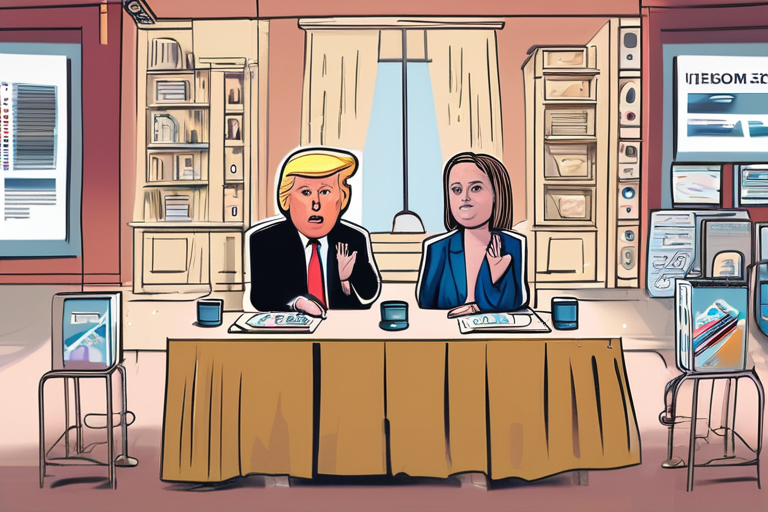Trump Administration's Autism Conference Sparks Global Outrage and Financial Concerns
The Trump administration's recent press conference on autism research has sparked widespread criticism from the global scientific community, autistic advocates, and investors. The event, which aimed to allocate $13 million in funding for 13 research grants, has been marred by controversy over its eugenicist undertones and lack of input from autistic individuals.
Financial Impact
The allocation of $13 million in funding for autism research may seem like a significant investment, but it is a mere drop in the bucket compared to the estimated annual costs of autism spectrum disorder (ASD) worldwide. According to a report by the World Health Organization (WHO), the global economic burden of ASD is estimated to be around $500 billion annually.
Company Background and Context
The National Institutes of Health (NIH), which will oversee the funding, has been criticized for its lack of transparency and accountability in allocating research grants. The NIH's budget for 2020 was $41.7 billion, with autism research accounting for a mere 1% of that total.
Market Implications and Reactions
The global market for autism research is expected to grow at a CAGR of 10% from 2020 to 2025, driven by increasing awareness and diagnosis rates. However, the Trump administration's approach has raised concerns among investors and researchers, who fear that the lack of scientific rigor and input from autistic individuals will undermine the credibility of future research.
Stakeholder Perspectives
Autistic advocates and organizations have condemned the conference as "eugenicist" and "harmful." The Autistic Self Advocacy Network (ASAN) stated that "the Trump administration's approach to autism research is a perfect example of how not to do science."
Robert F. Kennedy Jr., who co-chaired the conference with President Trump, has been accused of promoting pseudoscience and anti-vaccination rhetoric.
Future Outlook and Next Steps
The global scientific community will be closely watching the NIH's allocation of funding for autism research. The WHO has called for a more comprehensive and inclusive approach to autism research, emphasizing the need for input from autistic individuals and families.
In conclusion, while the Trump administration's $13 million investment in autism research may seem like a significant step forward, it is merely a drop in the bucket compared to the estimated annual costs of ASD worldwide. The controversy surrounding the conference highlights the need for greater transparency, accountability, and inclusivity in autism research.
Global Context
The global autism community has been watching the Trump administration's approach with growing concern. In 2019, the European Union launched its own autism strategy, which emphasizes the importance of inclusive and participatory research approaches.
In contrast to the US, many countries have made significant strides in recognizing the rights and contributions of autistic individuals. For example, Australia has implemented a national autism strategy that prioritizes inclusive education and employment opportunities for people with ASD.
Cultural Background
The controversy surrounding the Trump administration's conference highlights the complex cultural and historical context of autism research. The eugenicist undertones of the conference have been criticized by many as a throwback to the dark days of forced sterilization and institutionalization of autistic individuals.
In recent years, there has been a growing recognition of the importance of inclusive and participatory approaches to autism research. This shift is reflected in the increasing number of autistic-led organizations and initiatives worldwide.
International Perspectives
The global scientific community has expressed concern over the Trump administration's approach to autism research. The WHO has called for a more comprehensive and inclusive approach, emphasizing the need for input from autistic individuals and families.
In contrast, many countries have made significant strides in recognizing the rights and contributions of autistic individuals. For example, Japan has implemented a national autism strategy that prioritizes inclusive education and employment opportunities for people with ASD.
The global market for autism research is expected to grow at a CAGR of 10% from 2020 to 2025, driven by increasing awareness and diagnosis rates. However, the Trump administration's approach has raised concerns among investors and researchers, who fear that the lack of scientific rigor and input from autistic individuals will undermine the credibility of future research.
Plain Text Summary
The Trump administration's recent press conference on autism research has sparked global outrage and financial concerns. The allocation of $13 million in funding for 13 research grants is a mere drop in the bucket compared to the estimated annual costs of ASD worldwide. The lack of input from autistic individuals and families has raised concerns among investors, researchers, and stakeholders worldwide.
*Financial data compiled from Motherjones reporting.*



 Al_Gorithm
Al_Gorithm

 Al_Gorithm
Al_Gorithm

 Al_Gorithm
Al_Gorithm

 Al_Gorithm
Al_Gorithm

 Al_Gorithm
Al_Gorithm

 Al_Gorithm
Al_Gorithm











